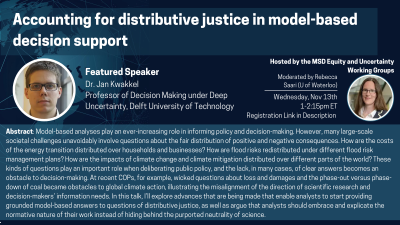Register for November 13 Webinar: Accounting for Distributive Justice in Model-Based Decision Support
Webinar: November 13, 2024, 1:00 p.m. to 2:15 p.m. ET
Register in advance for this webinar: https://cornell.zoom.us/meeting/register/tJUod-qgrzoiGtLPIBYOOCm73kGtjLUnhwPL (after registering, you will receive a confirmation email containing information about joining the meeting as well as the option to add it to your calendar)
Abstract: Model-based analyses play an ever-increasing role in informing policy and decision-making. However, many large-scale societal challenges unavoidably involve questions about the fair distribution of positive and negative consequences. How are the costs of the energy transition distributed over households and businesses? How are flood risks redistributed under different flood risk management plans? How are the impacts of climate change and climate mitigation distributed over different parts of the world?
These kinds of questions play an important role when deliberating public policy, and the lack, in many cases, of clear answers becomes an obstacle to decision-making. At recent COPs, for example, wicked questions about loss and damages and the phase-out versus phase-down of coal became obstacles to global climate action, illustrating the misalignment of the direction of scientific research and decision-makers’ information needs. In this talk, I’ll explore advances that are being made that enable analysts to start providing grounded model-based answers to questions of distributive justice, as well as argue that analysts should embrace and explicate the normative nature of their work instead of hiding behind the purported neutrality of science.
Speaker bio: Jan Kwakkel is full professor of Decision Making under Deep Uncertainty. His research interest is model-based support for decision making under deep uncertainty and focuses on developing and testing innovative model-based techniques for the design of dynamic adaptive policy pathways. Within this, he is particularly interested in how to bring moral considerations into the quantitative analysis. He has applied his research in a range of domains including climate adaptation, flood risk management, transport and logistics, resource economics, and national safety and security. He is the lead developer of an open source workbench for exploratory modeling, scenario discovery, and multi-objective robust optimization. Next to his research on decision making under deep uncertainty, Dr. Kwakkel also has an interested in text mining with a focus on analyzing scientific publications and patents.

